First of all, thanks to Graig, Dan, and Adam for a year of insightful writing about comics (and for picking up the slack when I have nothing ready– like today/).
Secondly, we’re skipping next week for the holidays, and will return in early January. Thanks to all of you, and everyone at CHUD, for another year of reading and commenting!
Masks #1-2 (Dynamite, $3.99)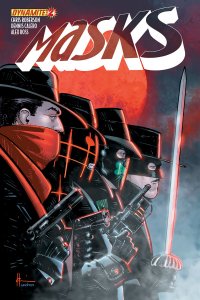
By Adam Prosser
The so-called Golden Age of comics, and the pulp era that preceded and overlapped it, was a time of tremendous innovation for pop culture…but it was also a time of duplication and appropriation. Superman, for instance, inspired some truly shameless imitators as well as the more unique ones like Captain Marvel—ever heard of the original (non-Marvel) Wonder Man? Since comics were seen (even more than usual) as disposable junk, publishers were in it to make a quick buck, and if jumping on the latest trend wagon was the way to do it, they’d do so with as little effort as possible. This was true of other popular media like radio and pulp novels as well, which is why “masked mystery men”-style characters proliferated in the wake of the Shadow. While many of these characters have been forgotten, some have lingered on around the fringes of pop culture.
Almost a century later, comics and superhero fandom have become strangely archivally-minded, which means nothing ever gets forgotten, and every property can be seen as having merit. This is strangely comforting even as it’s somewhat weird to see companies scrambling to cash in on these ancient, dusty properties that haven’t been seen as moneymakers since before Tojo attacked Pearl Harbour. Of course, the real long-lasting pop cultural heavyweights are tied up at the “big” companies, but there’s still value in the quirkier stuff, as proven by the fact that four of the lead characters of Dynamite’s “Masks” have had movies made about them.
An attempt to create a sort of League of Extraordinary Gentlemen or Justice League out of pre-superhero pulp mystery characters (The Shadow, the Green Hornet and Kato, Zorro, and The Spider, with others starting to pop up in the second issue), Masks is a slightly ungainly beast. It’s significant that none of these characters were known primarily for appearing in comics back in their heyday (they originate in radio and pulp magazines), which is why they don’t quite work together visually the way most superhero teams do—it’s three white dudes in fedoras and capes or trenchcoats, plus Kato and a new Zorro (apparently the grandson or great-grandson of the original) who hasn’t gotten into costume yet. Public-domain superheroes The Green Ghost and Miss Masque make an appearance in issue 2, but the focus is on the four masked vigilantes, and in addition to looking the same, there’s unfortunately not too much to distinguish their characters or M.O.s either. The Shadow is a straight-faced supernatural force, and the Hornet is a regular joe; The Spider I couldn’t tell you much about except that he’s the DA of New York in his day job.
Writer Chris Roberson has impressed me in the past as a geek’s geek, having written a terrific run on Superman that almost salvaged the mess J. Michael Straczynski made of him, founding Monkeybrain digital comics, and writing a fun Elric series for Boom! which took the same “let’s combine every character” attitude found here to the works of Michael Moorcock. It should also be noted that the bad guys in that latter series were a group of creeping fascists who slowly took over the hero’s society, a premise Roberson reuses here (though in both cases he’s clearly taking a page from the original stories—the Justice Party that the heroes face off against here apparently have their roots in one of the Spider’s adventures). With Masks, Roberson acquits himself perfectly well, but I feel like he’s starting to spread himself a bit too thin; this premise and these characters needed a pretty spectacular reinvention to stand out in a world that’s evolved past them, and without that this seems mostly like a wallow in nostalgia with a group of old relics. While this is something comics have never shied away from, it’s hard to feel like this is anything special either, which isn’t how I want to feel when a group of icons get together.
Rating: 




Out of a Possible 5 Stars
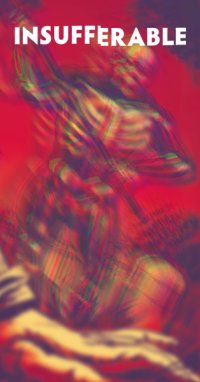 Insufferable #1-3 (Thrillbent, $0.99 – $1.99, available on Comixology)
Insufferable #1-3 (Thrillbent, $0.99 – $1.99, available on Comixology)
by D.S. Randlett (@dsrandlett)
I’m way behind on Mark Waid’s creator owned superhero stuff. I wasn’t reading comics when he started Irredeemable and Incorruptible, two mirrored and intersecting stories that follow a superhero gone bad and a supervillain made good. I’ve heard good things, and it’s been on the back burners of my mind now that I’ve gotten back into comics this past year and a half. Judging from these collections of Waid’s “side” webcomics project, Insufferable, which I would assume takes place in the same superhero universe as his other creator owned work even though you wouldn’t know it, I really need to get on that.
Waid’s always had a talent for digging into the superhero concept and telling honest stories. His legendary run on The Flash is a testament to this, along with his (mostly) definitive treatment of Superman’s origins in Birthright. Like Kurt Busiek, he’s one of those creators that I always seem to take for granted, producing work in the superhero genre that doesn’t seek to transcend the genre, but rather to fulfill its promise. Waid specializes in taking masked heroes and using them to explore the concerns of the modern psyche, which is what the purpose of good heroic fiction is. He doesn’t reinvent the wheel, sure, but he fulfills the basic contract of heroic fiction: it presents us with a mirror world through which we can contend with our own culture.
Insufferable is, at its base, a story about fathers and sons. More than that, it is the story of a generational rift. The key players here are the urban vigilantes, the middle-aged Nocturnus, a very old school (and it must be admitted, his costume is really cool) “stick to the shadows” hero in the Batman mold, and his Red Hood-esque social networking son, Galahad. The stopped talking shortly after the death of Nocturnus’ wife (and Galahad’s mother). They meet by chance during the foiling of a serial killer’s plans, and after that things take a supernatural turn. The person that they both lost might still be alive. Somehow.
The heroes are following a mystery, but the focus remains squarely on the emotional realm that they both inhabit. All too often, superhero (hell, SF and Fantasy, too) writers focus on the mythologies that they’ve created, which always gives an air of falsehood. Waid smartly lets information about the world grow out of the actions and emotions of his characters. A larger, more unique world is hinted at, but we never lose our focus on the characters or their struggles.
The art by Peter Krause is very, very good, especially from a design standpoint. He makes it look as if this superhero universe has been around for a very long time. It has that coveted “lived in” feel that’s more than a mere aesthetic. He conveys a lot of information about the world simply through good design, and it really makes this story come alive. Insufferable is designed for digital consumption, and the layout reflects this. Pages are smaller, and there are some low key flashes of something resembling animation. It’s usually used for pacing, but there’s only one instance in the second “issue” where it well and truly works. The rest of the time the experiment is appreciated and adequate, but nothing more than that.
Rating: 




Out of a Possible 5 Stars
Dark Horse Presents #19 (Dark Horse, $7.99)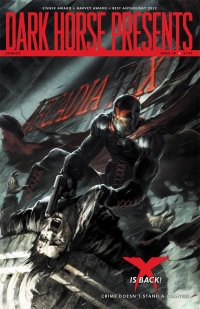
The Black Beetle: Night Shift #0 (Dark Horse, $2.99)
JSA Liberty Files: The Whistling Skull #1 (DC, $2.99)
By Graig Kent
I’ve developed a natural aversion to anthologies over the past 8 years of doing reviews here at Thor’s Comic Column. They are, without fail, a mixed bag, and depending on whether the creative talents have freedom to tell the story they want with whatever page count they require or if they’re confined to an editorially mandated length, the true artistic nature of a comic book anthology can be somewhat suspect.
Dark Horse Presents is a monthly bloated, 80-page,10-story collection that gives their creators some leeway, in that they’re confined to telling their story in 8-page chapters, but they can have one or many chapters to play with. It would appear that 3 or 4 chapters is preferable as it then allows Dark Horse to reprint the story in a single floppy (as they have done with The Black Beetle #0, but more on that shortly). Dark Horse, as a company, has had a long history with anthologies with no shortage of incredible talent involved. However, I just feel that short stories in comics are inherently disposable, and amassed together in one volume serves only to make for an utterly disposable comic.
But then, comics were born as a disposable medium, and the serialized, monthly nature of them, like radio, television and even cinema in its inception were originally meant to be singular experiences. We have, as a culture, identified the significance of entertainment as art as much as escapism, and as a result have taken great pains to preserve, recycle, regurgitate, and keep our entertainment prominent within our lives. This leads to frequent reprinting of older material, revivals of languishing properties, and a lot of treading on whatever potential nostalgia might be out there, as well as capitalizing upon trends. Sometimes its commercial, sometimes it’s creative, and sometimes it’s satisfying a gap in the marketplace (and sometimes a composite of the three).
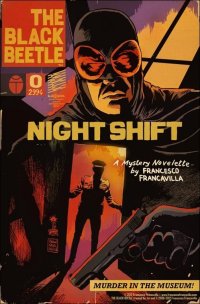 The latest Dark Horse Presents encompasses all of this, starting with a needless revival the company’s mid-90’s superhero property, X, and doing very little with its short 8-pages to establish any sense of character beyond the expected vigilante tropes. In what is no doubt to be the next big trend (scuttling vampires and zombies to the side for a bit), there are three different giant monster stories within this collection, all touching upon similar concepts that will no doubt be seen in the forthcoming Pacific Rim. I’m a sucker for giant monster tales, to the point that marginal variations between the third part of “Deep Sea” (by Justin Palmiotti, Justin Grey and Tony Akin), the second part of “Gamma” (by Ulises Farinas and Erick Freitas) and Station To Station chapter 1 (by Corinna Bechko and Gabriel Hardman) were enough that I actually quite enjoyed all three tales. Still, it’s a little extreme to have 3 such stories in an anthology not dedicated to telling giant monster tales, salvageable only by the fact that the kaiju genre has not yet enjoyed complete overexposure.
The latest Dark Horse Presents encompasses all of this, starting with a needless revival the company’s mid-90’s superhero property, X, and doing very little with its short 8-pages to establish any sense of character beyond the expected vigilante tropes. In what is no doubt to be the next big trend (scuttling vampires and zombies to the side for a bit), there are three different giant monster stories within this collection, all touching upon similar concepts that will no doubt be seen in the forthcoming Pacific Rim. I’m a sucker for giant monster tales, to the point that marginal variations between the third part of “Deep Sea” (by Justin Palmiotti, Justin Grey and Tony Akin), the second part of “Gamma” (by Ulises Farinas and Erick Freitas) and Station To Station chapter 1 (by Corinna Bechko and Gabriel Hardman) were enough that I actually quite enjoyed all three tales. Still, it’s a little extreme to have 3 such stories in an anthology not dedicated to telling giant monster tales, salvageable only by the fact that the kaiju genre has not yet enjoyed complete overexposure.
One-off or multi-part chapters of established Dark Horse creator-owned properties like “Alabaster” (by Caitlin R. Kiernan and Steve Lieber), “Resident Alien” (by Steve Parkhouse and Peter Hogan) and “MIND MGMT” (by Matt Kindt) are likely the draw for many to this book. Having dished out a 5-star review of MIND MGMT recently, naturally that was the draw for me. The benefit of such a tactic for Dark Horse is exposing a reader to other established or upcoming properties, while the potential side effect might be the sense of getting charged a buck-per-page to get the only story they actually wanted. For my part, I’m not quite curious about the gruesome urban fantasy of Alabaster and the quiet, small-town extra-terrestrial-ness of Resident Alien, and will likely be watching for trades on both of those series.
“The White Suits”, chapter 2 (by Frank Barbiere and Giovanni Valletta is a curious but hollow investigative journalism mystery about a Russian secret society, while “Crime Does Not Pay presents City of Roses” chapter 4 (by Phil Stanford and Patrick Reynolds) is a passable crime drama made interesting only by the stupidity of its characters. The remaining story is perhaps my favourite, the second chapter of Captain Midnight (by Josh Williamson and Victor Ibanez). It’s a play off WWII hero-out-of-time of Captain America, but the character, abilities and intelligence of Captain Midnight differentiate him well and make him quite compelling. It’s a stark contrast juxtaposing the wartime pulp hero brought to modern day against the modern-day-set pulp-inspired vigilante of of X, and both attempt to explain their characters through reputation and actions, it’s just that Captain Midnight explains the motivations of the man quite simply, while X is just another faceless killer of bad guys (which makes him good, right).
A similar problem faces Francesco Francavilla’s The Black Beetle in Night Shift. This is an outright wartime pulp vigilante tale — compiled from a three-part tale originally published in Dark Horse Presents — but it’s solely story-focused so we get no real sense of who Francavilla’s protagonist is. By the end of the three chapters (acting as “pilot” for the ongoing series, as many of the Dark Horse Presents #19 stories seem to be) it seems there’s a purpose to that vague-ness, that he’s perhaps not just a costumed Nazi-hunter on domestic soil but has his own agenda.
Francavilla made quite an impression on me in his work on Scott Snyder’s pre-“New 52” Detective Comics stories, and his ink-heavy, Eisner-inspired art echoes with whispers of Steve Rude, but with the color sensibility of a master like Dave Stewart, working virtually duochromatic throughout the book. It’s stunningly visual with a great sense of design. Not as audacious as, say, J.H. Williams III but there’s the impression Francavilla could go there if he wanted to. Though the story itself is not high on innovation, Francavilla’s art perfectly suited to the pulp hero genre, and after the severely underwhelming Masks, this was quite a palette cleanser.
JSA The Liberty Files: The Whistling Skull, however, trumps the bulk of the increasingly crowded field pulp-inspired 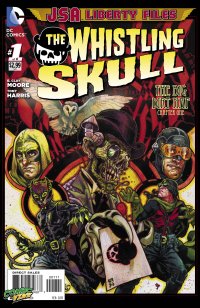 comics (a genre trend that hasn’t broken any wider than comics as yet). It’s an unexpected revival of the somewhat obscure Liberty Files “Elseworlds” endeavor from the early aughts, but obviously creator Tony Harris has enough cache within DC to bring it back.
comics (a genre trend that hasn’t broken any wider than comics as yet). It’s an unexpected revival of the somewhat obscure Liberty Files “Elseworlds” endeavor from the early aughts, but obviously creator Tony Harris has enough cache within DC to bring it back.
The original mini-series’ (“The Liberty File” and “The Unholy Three”) took Batman and the JSA and posited them as undercover/costumed government agents integral to the American wartime effort. The Whistling Skull, at least in the first issue, deviates greatly from even that little-known terrain by introducing a pair of brand-new heroes, The Whistling Skull and his mentally stunted strong-arm associate Knuckles that plays out like a costumed adventurers in WWII version of Forrest Gump and Lieutenant Dan. Any trace of the JSA is reserved for the opening teaser before the book descends rapidly into flashbacks of William and Nigel, the Skull and Knuckles alter-egos meeting innocuously as children, then just as rapidly advances 15 years into the main thrust of the series.
Writer B. Clay Moore alongside Harris, in an exceptionally rapid fashion, establish these two characters, providing a tremendous amount of depth within a very short time frame. I’m utterly enamored with the Whistling Skull as a character, his vaguely mystical heritage, the sense of legacy that he maintains, and his curious partnership with Nigel (which just begs the question “how did this all come about”)? I jumped aboard “the Liberty Files” with expectations of seeing some noirish adventure starring alternate JSA characters, and instead received a pulpy 40’s mystical adventure serial starring a completely unknown, oddball hero, and was, frankly delighted. Though toying with a property that is, effectively, DC’s, Moore and Harris seem to be invested in this series as if it were creator-owned. There’s a tangible level of love and personal commitment that is sorely missing from the bulk of DC’s output these days.
Dark Horse Presents #19 is one of the better collection of stories I’ve read in recent years, but inessential, especially when, it would appear, anything of merit will wind up in a trade or its own book… like the Black Beetle. The Black Beetle adopts the pastiche of pulp wonderfully while The Whistling Scull transcends it.
Dark Horse Presents #19 Rating: 




Out of a Possible 5 Stars
The Black Beetle: Night Shift #0 Rating: 




Out of a Possible 5 Stars
JSA The Liberty Files: The Whistling Skull #1 (of 6) Rating: 




Out of a Possible 5 Stars